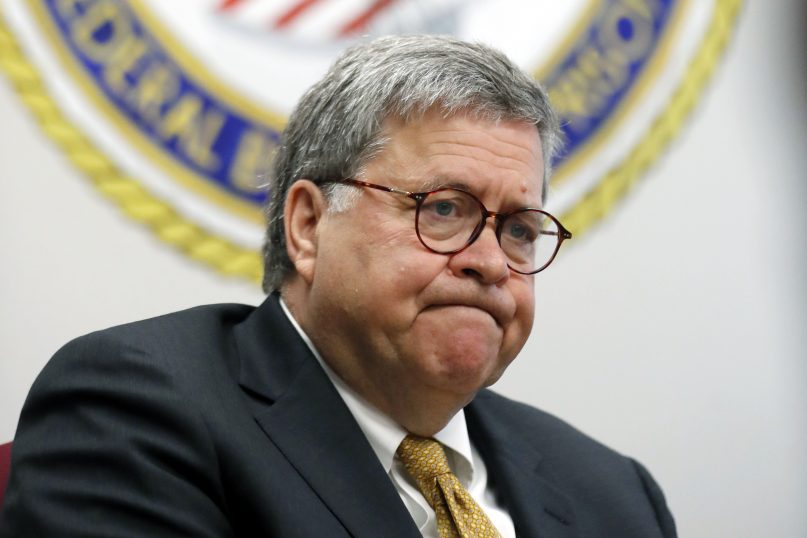Attorney General William Barr’s announcement last week that he is lifting the Justice Department’s moratorium on federal death penalty executions has again raised the issue of whether a Catholic government official who advances policy condemned by his church ought to be denied communion.
Here at RNS, columnist Charles Camosy says yes. He believes that Barr’s bishop, Michael Burbidge of the diocese of Arlington, should “ask to sit down with Barr and respectfully insist on his faithfulness to the teaching of the church.” If Barr doesn’t, then the bishop “would be justified” in asking Barr not to show up at the altar rail.
Over at U.S. Catholic, retired Catholic University professor Stephen Schneck says no. While insisting that Catholics in public life should “bring their faith to bear when addressing the laws and policies of the political orders,” he urges “my fellow American Catholics on all sides in public life to forego any new rounds of the Communion Wars. Regarding the sacraments, we are wrong to judge and wrong to politicize.”
Thus far, Burbidge has made no public statement on the matter, so we can only speculate about whether he’s invited Barr for a sit-down. The official hierarchical response has come from Bishop Frank J. Dewane, chair of the bishops’ Committee on Domestic Justice and Human Development.
Dewane cites decades-long papal criticism of the death penalty, culminating in Pope Francis’ recent amending of the church’s Catechism to say that capital punishment is “inadmissible because it is an attack on the inviolability and dignity of the person.” He points out that in June the U.S. bishops voted “overwhelmingly” to support this position and concludes by urging that “Federal officials take this teaching into consideration, as well as the evidence showing its unfair and biased application, and abandon the announced plans to implement the death penalty once more.”
More pointedly, Chicago’s Cardinal Blase Cupich, a leading Francis supporter, tweeted: “Today, Attorney General William Barr announced that he was reversing a moratorium on the federal death penalty. This decision is gravely injurious to the common good, as it effaces the God-given dignity of all human beings, even those who have committed terrible crimes.”
Neither Dewane nor Cupich, however, suggested that Barr has something to answer for as a prominent Catholic layman (a Knight of Columbus and past board member of the KoC and the Catholic Information Center of Washington, D.C., among other things). Their criticism has, in other words, not been comparable to the way some bishops called out Catholic government officials like John Kerry and Kathleen Sebelius for their support of abortion rights.
In fact, and in contrast to the abortion issue, there has been pushback in high ecclesiastical places against the Vatican’s evolved position on capital punishment. Foremost among those pushing back has been Cardinal Raymond Burke, the sometime archbishop of St. Louis whom Francis removed as head of the Vatican’s highest court in 2014.
On May 31, Burke and four other hierarchs issued an eight-page “Declaration of the truths relating to some of the most common errors in the life of the Church of our time” that included the assertion that “the Church did not err in teaching that the civil power may lawfully exercise capital punishment on malefactors where this is truly necessary to preserve the existence or just order of societies.” This assertion, which Burke reiterated in a keynote address at the Napa Institute’s annual gathering last week, was not just a slap at the present pope but also at John Paul II, who in his 1995 encyclical Evangelium Vitae (The Gospel of Life) called capital punishment impermissible “[i]f bloodless means are sufficient to defend human lives against an aggressor and to protect public order and the safety of persons.”
The authorities cited in the Declaration make clear that what Burke’s latter-day Syllabus of Errors means by “just order” is altogether different from John Paul’s concern for public safety, and a far cry from Francis’ counter-argument that “the dignity of the person is not lost even after the commission of very serious crimes.”
One is a paragraph in the Catechism of the Council of Trent that calls the “just use” of capital punishment “an act of paramount obedience” to the Fifth Commandment’s injunction against murder. Another is a 1954 speech by Pope Pius XII that assumes the legitimacy of the death penalty and does not exclude “vindictive punishment” as a way of reestablishing “the order of the true and the good.”
Barr’s justification for re-instituting federal executions, set forth in the Justice Department’s press release, is of a piece with the Declaration:
“Congress has expressly authorized the death penalty through legislation adopted by the people’s representatives in both houses of Congress and signed by the President,” Attorney General Barr said. “Under Administrations of both parties, the Department of Justice has sought the death penalty against the worst criminals, including these five murderers, each of whom was convicted by a jury of his peers after a full and fair proceeding. The Justice Department upholds the rule of law—and we owe it to the victims and their families to carry forward the sentence imposed by our justice system.”
Today’s Catechism defines scandal as “an attitude or behavior which leads another to do evil,” adding that it “takes on a particular gravity by reason of the authority of those who cause it.” Catechetically speaking, it is scandalous for Barr to go out of his way to violate church teaching.
I have no interest in encouraging new rounds of the Communion Wars. But it seems to me that if Catholic leaders want to defend their church, they shouldn’t treat the attorney general as if he were just another government official with whom they disagree.






